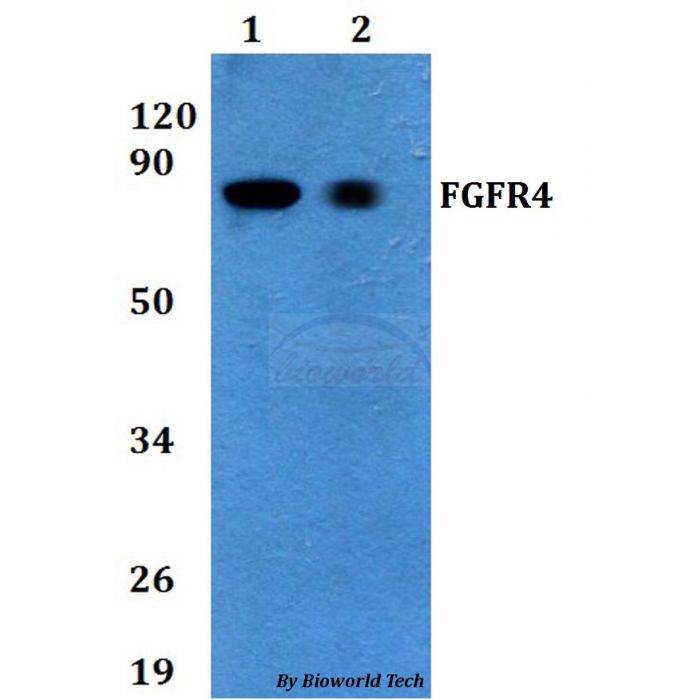CD334 (FGFR4) polyclonal, anti-human, mouse, rat
€305.00
In stock
SKU
BS60719
Background:
Acidic and basic fibroblast growth factors (FGFs) are members of a family of multifunctional polypeptide growth factors that stimulate proliferation of cells of mesenchymal, epithelial and neuroectodermal origin. Like other growth factors, FGFs act by binding and activating specific cell surface receptors. These include the Flg receptor or FGFR-1, the Bek receptor or FGFR-2, FGFR-3, FGFR-4, FGFR-5 and FGFR-6. These receptors usually contain an extracellular ligand-binding region containing three immunoglobulin-like domains, a transmembrane domain and a cytoplasmic tyrosine kinase domain. The gene encoding human FGFR-4, unlike the other FGFR genes, is alternatively spliced to produce only one isoform. It is expressed in fetal adrenal, lung, kidney, liver, pancreas, intestine, striated muscle and spleen tissues. FGFR-4 is also overexpressed in breast cancers and, subsequently, is a potential target for drug therapy.
Alternative Name:
Fibroblast growth factor receptor 4, FGFR-4, CD334, FGFR4, JTK2, TKF
Application Dilution: WB: 1:500~1:1000
Specificity: FGFR4 polyclonal antibody detects endogenous levels of FGFR4 protein.
Immunogen:
A synthetic peptide corresponding to residues in Human FGFR4
MW: ~ 88 kDa
Swis Prot.: P22455
Purification & Purity:
The antibody was affinity-purified from rabbit antiserum by affinity-chromatography using epitope-specific immunogen and the purity is > 95% (by SDS-PAGE).
Format:
1 mg/ml in Phosphate buffered saline (PBS) with 15 mM sodium azide, approx. pH 7.2.
Storage:
Store at 4°C short term. Aliquot and store at -20°C long term. Avoid freeze-thaw cycles.
For research use only, not for use in diagnostic procedure.
Acidic and basic fibroblast growth factors (FGFs) are members of a family of multifunctional polypeptide growth factors that stimulate proliferation of cells of mesenchymal, epithelial and neuroectodermal origin. Like other growth factors, FGFs act by binding and activating specific cell surface receptors. These include the Flg receptor or FGFR-1, the Bek receptor or FGFR-2, FGFR-3, FGFR-4, FGFR-5 and FGFR-6. These receptors usually contain an extracellular ligand-binding region containing three immunoglobulin-like domains, a transmembrane domain and a cytoplasmic tyrosine kinase domain. The gene encoding human FGFR-4, unlike the other FGFR genes, is alternatively spliced to produce only one isoform. It is expressed in fetal adrenal, lung, kidney, liver, pancreas, intestine, striated muscle and spleen tissues. FGFR-4 is also overexpressed in breast cancers and, subsequently, is a potential target for drug therapy.
Alternative Name:
Fibroblast growth factor receptor 4, FGFR-4, CD334, FGFR4, JTK2, TKF
Application Dilution: WB: 1:500~1:1000
Specificity: FGFR4 polyclonal antibody detects endogenous levels of FGFR4 protein.
Immunogen:
A synthetic peptide corresponding to residues in Human FGFR4
MW: ~ 88 kDa
Swis Prot.: P22455
Purification & Purity:
The antibody was affinity-purified from rabbit antiserum by affinity-chromatography using epitope-specific immunogen and the purity is > 95% (by SDS-PAGE).
Format:
1 mg/ml in Phosphate buffered saline (PBS) with 15 mM sodium azide, approx. pH 7.2.
Storage:
Store at 4°C short term. Aliquot and store at -20°C long term. Avoid freeze-thaw cycles.
For research use only, not for use in diagnostic procedure.
| Is Featured? | No |
|---|
Write Your Own Review

